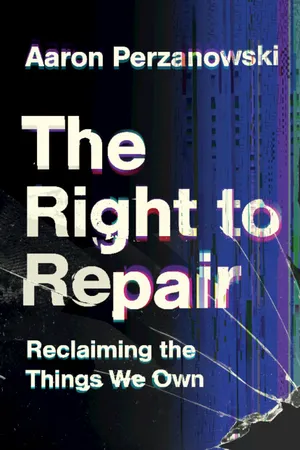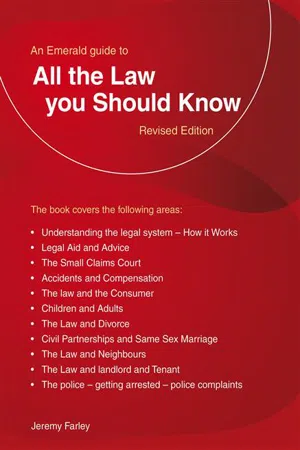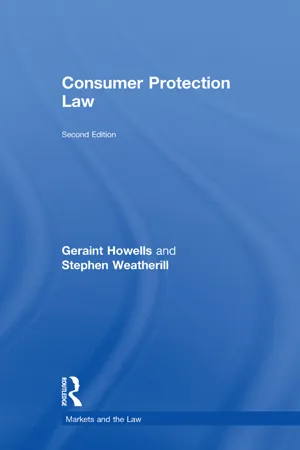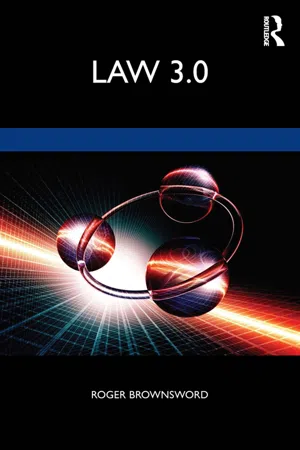Business
Consumer Law
Consumer law refers to the body of regulations and statutes that aim to protect consumers from unfair or deceptive business practices. It covers a wide range of issues, including product safety, advertising, and consumer rights. Consumer laws are designed to ensure that businesses operate fairly and transparently, and that consumers are able to make informed decisions and seek redress when necessary.
Written by Perlego with AI-assistance
Related key terms
1 of 5
4 Key excerpts on "Consumer Law"
- eBook - PDF
The Right to Repair
Reclaiming the Things We Own
- Aaron Perzanowski(Author)
- 2022(Publication Date)
- Cambridge University Press(Publisher)
In the United States, consumer-protection law embraces a constellation of related and overlapping federal and state statutes. Broadly, these laws are meant to empower regulators and consumers to push back on deceptive, unfair, and abusive practices in the marketplace. Some, like the Federal Trade Commission Act, confer broad authority to regulators to police market behavior. 1 Others, like the Fair Debt Collection Practices Act, set rules for very specific marketplace interactions – in that case, banning debt collectors from contacting consumers “at any unusual time or place.” 2 These laws can be enforced by federal agencies, like the Federal Trade Commission (FTC) and the Consumer Financial Protection Bureau, or state-level con- sumer affairs departments and attorneys general. And in many instances, consumers can bring claims directly. Similarly, European law incorporates both broad standards and sector- specific prohibitions at both the EU and national levels. 3 Many of the restrictions on repair we’ve seen implicate con- sumer-protection laws. Misleading statements or omissions about product reparability might constitute deceptive trade practices. Failures to make repair parts available can violate state statutory guarantees. And the common practice of threa- tening to void warranties because of independent repair runs contrary to established federal law. Device makers may insist that consumers are best protected by tightly controlled repair markets. But the law recognizes that device makers themselves may well pose the most serious risks to consumers. Consumer protection offers powerful and applicable legal tools that could defend independent repair, but they have not been effectively utilized by the FTC and state attorneys general. Clearer guidance and more vigorous enforcement efforts could go a long way towards curbing some of the most abusive tactics device makers deploy. - eBook - ePub
- (Author)
- 2016(Publication Date)
- Emerald Publishing(Publisher)
Ch. 6
Consumer Protection Generally
Consumers are protected by both civil and criminal law. As we shall see below, the general law of contract gives some protection, especially from misrepresentation. There are special rules for consumer contracts, including:· Contracts for buying goods · Contracts for services · Distance selling · Other areas such as package holidays, insurance, food and financeThe tort of negligence gives limited protection where the consumer has no contractual rights. In addition, there is protection from defective goods under the Consumer Protection Act 1987. The criminal law also affords some protection against such matters as trade descriptions.The law of contract All transactions between consumers and suppliers are based on the law of contract. Every exchange of goods is an agreement between buyer and seller.It therefore follows that underlying each exchange is an area of law which defines the rights and obligations of both buyer and seller. The purchaser and the person who sells goods and services are not free to do exactly as they wish after the sale or, indeed, make up the rules as they go along.The major area of law which supported and assisted consumers was the Sale of Goods Act 1979, as amended by the Sale and Supply of Goods Act 1994. From October 1st 2015, the Consumer Rights Act has consolidated these Acts, along with the Unfair Terms in Consumer Contracts Regulations 1999.The Consumer Rights Act 2015 Goods Under the Consumer Rights Act 2015, all goods supplied under a consumer contract should: • be of satisfactory quality; • be fit for purpose; • match the description, sample or model; and • be installed correctly (if part of the contract). Rights of a consumer to return goods Under the CRA 2015There is an Initial rights to reject the goods – an automatic 30 day period to return the goods if they do not meet the implied terms unless the expected life of the goods is shorter than 30 days. This right entitles the consumer to a 100% refund. - eBook - ePub
- Geraint Howells, Stephen Weatherill(Authors)
- 2017(Publication Date)
- Routledge(Publisher)
Whichever style of categorisation is preferred, modern consumer contract law operates in a manner quite distinct from the classic (and rather exaggerated) notions of individual freedom to contract and legal non-interventionism. Both judicial and legislative developments have combined to establish a pattern of control over the private supplier/consumer relationship.1.4 TORT LAW AND THE CONSUMER
Tort law is largely the product of the judges, although a statutory overlay has recently increased in importance. Over the course of the last 100 years, the ability of the consumer to proceed in tort against traders with whom he or she has no contractual relationship has in many respects been enhanced. Tort law, whether judge made or statutorily developed, blurs further the simplicity of freedom of contract and the notion that private parties have autonomy to fix the limits of liability incurred for their actions.The very existence of tort law is a recognition that obligations agreed between contracting parties are an inadequate expression of legal responsibility in modern society.84 As a matter of policy, tort law imposes certain duties on individuals to compensate other individuals in the event that loss is suffered. This notion of ‘fairness beyond the bargain’ is already part of contract law in the shape of statutory intervention to place certain core implied terms in consumer (and other) contracts, but tort law takes the scope of such obligations beyond the contractual network. The ebb and flow of the imposition of liability in tort reflect shifting judicial conceptions of the appropriate place for loss to be borne in the absence of a pre-existing contractual arrangement agreeing allocation of responsibility. Study of those judicial choices is itself a fascinating field of inquiry.85 The flexible and value-laden standards of negligence liability provide many insights into judicial conceptions of loss bearing in particular and fairness in society in general.86 - eBook - ePub
Law 3.0
Rules, Regulation, and Technology
- Roger Brownsword(Author)
- 2020(Publication Date)
- Routledge(Publisher)
Karsales (Harrow) v Wallis (1956)), and if this were anything like a common occurrence, then it surely would not be long before someone would suggest that the regulatory environment, like the car, was broken. After all, in the wake of one crisis, catastrophe, or scandal after another, we find some part of the blame being apportioned to a regulatory environment that has proved to be unfit for purpose. Nowadays, if we detect a crisis in the consumer marketplace, we will know that an effective response to the problem is likely to involve more than a tweak to the law of contract (or even a bespoke piece of legislation such as the Consumer Rights Act 2015). To get the regulatory environment right, it might also be necessary to make reforms in competition law, in credit law, and criminal law as well as changes in the technical standards for consumer goods and services. It might also be necessary to make changes to the regulatory agencies and, crucially, to take steps to change the business culture of those who supply goods and services in the consumer market.To pick up the autobiographical thread, soon after I started teaching the law of contract, I became aware of the seminal work of Stewart Macaulay (1963) and Ian Macneil (1980). At this stage, ‘law in context’ was barely off the drawing board and it was not obvious how these commentaries might be fitted into my lecture narrative that started with offer and acceptance and ended with remedies. Even if there had been slots for ‘context’ in that narrative, there would have been a temptation for students to interpret whatever contextual content was supplied as marginal to the main doctrinal story. So how do insights about the practice of business contractors or about the web of social relations in and around transactions become an integral and equal part of the story?Clearly, so long as the main story that we tell as teachers of the law of contract is the traditional Law 1.0 doctrinal story, there is a problem. Rather than starting with some segment of the law of contract, I suggest that the story needs to start with the idea that the field of interest is transactions (whether deep in the business world or in the consumer marketplace or in the emerging peer-to-peer shared economy) and that the particular focus is on the regulatory environment for transactions, that environment being understood in a broad way. However, we should not assume that the signals given by the law of contract necessarily are dominant in any particular transactional setting. There is a lot of noise in and around transactions, and in some environments, such as those studied by Macaulay, the signals given by the law of contract might be very weak indeed. Similarly, we know that in our everyday experience as consumers, whether offline or online, the legal signals are often much less prominent than the suppliers’ particular custom and practice, their concern for their trading reputation, and the side-arrangements that have been made for guarantees and warranties. We find ourselves, as Macneil points out, in a web of social relations.
Index pages curate the most relevant extracts from our library of academic textbooks. They’ve been created using an in-house natural language model (NLM), each adding context and meaning to key research topics.



